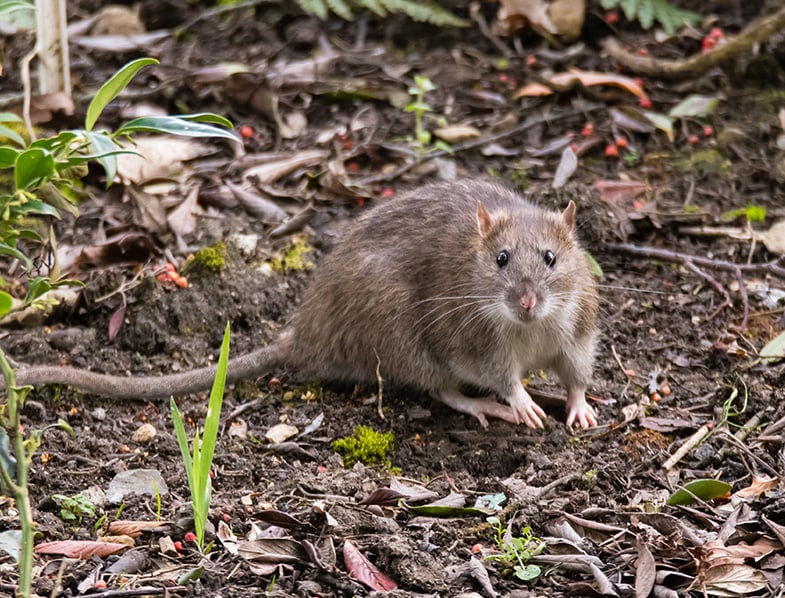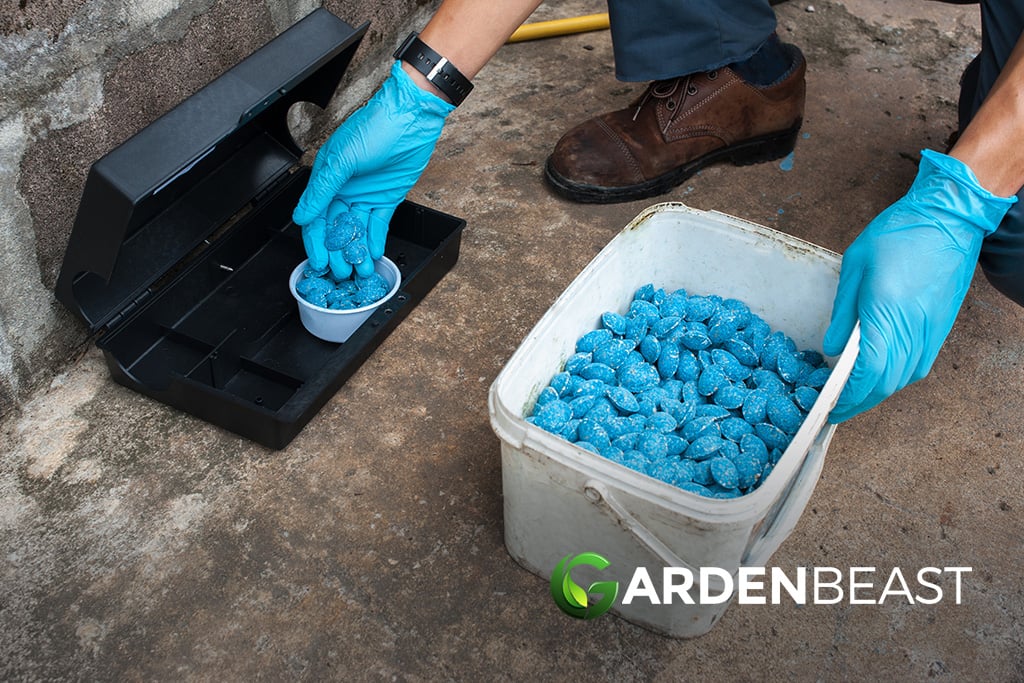How To Keep Rodents Away From Your Garden
Unless it's your pet hamster, any rodent is an unwanted guest in your garden or home.
After all, your garden is your pride and joy, and you've put in a lot of time and hard work into making it beautiful. Finally, when you start seeing results, disaster strikes: rodents turn your garden space into their playground, and do they like to play!
Although most gardeners believe that insects are the only garden pests, rodents can be much worse. Besides causing a lot of damage to your beloved garden, these furry pests can also spread disease or chew electrical wiring, which can result in a fire.
The bottom line is the little trouble makers have got to go. Or better yet, they should never come in the first place. If you know how to keep rodents out of garden spaces you don't have to face an infestation that can easily get out of hand. It's a known fact that rodents such as mice, rats, and rabbits can multiply very fast.

Most rodents have a three-week gestation period and can birth up to 14 babies. Moreover, a female can have up to 10 litters early, from which some will certainly be female. After a couple of months, these females will have babies of their own, and soon enough your garden will be a rodent haven. Eliminating them fast is essential if you want to save your garden.
Unfortunately, pest control is not always the option, as it can harm your plants as well as the environment. Also, it can be dangerous if you have pets or small children running around. And most of the time, getting rid of the rodents will not guarantee others won't pay you a visit. Your garden might provide perfect living conditions for these animals. Changing the habitat can discourage rodents from taking up residence.
Luckily, there are many safe ways to get rid of rodents and deter them so you can keep your garden safe and beautiful all year long. Keep on reading to find out more.
Signs of Rodents in the Garden
Contents
- 1 Signs of Rodents in the Garden
- 2 Why Do Rodents Invade Gardens?
- 3 How to Get Rid of Rodents
- 3.1 Keep the garden tidy
- 3.2 Eliminate their food and water sources
- 4 Block their access
- 5 Feed them instant potatoes
- 6 Get a pet
- 7 Use solar-powered repellers
It's time for that spring cleaning, so you try to get your garden into shape. While clearing the fallen leaves and the deadwood, you notice unwanted rodents such as rats lurking beneath the debris. This may come as a surprise because you haven't seen any all winter long. Many rodents are experts at hiding, so the only way to tell if you have an infestation is by recognizing the signs.
Rodents can nest into compost piles, lawns, garden beds, and ornamental plants and bushes. Once they take over your yard, they will want an upgrade to the deluxe suite: your warm and comfy home – especially as the cold sets in. Finding an entrance into garages, houses, or sheds is not difficult for these tiny creatures. Although gophers tend to remain outdoor, rats and mice will seek the warmth and comfort of a house. Looking for these signs will help you determine whether you have a rodent infestation so you can take appropriate measures:
- You see them running around. Keep an eye out for activity in your garden, especially at dawn and dusk. Watch for rats along power lines, fences, and trees. If you see them at night but not during the day, you're probably dealing with a small population that can be easily handled. If you see them during the day as well, the population is large and professional services might be necessary.
- Plants disappear completely or partially. Your new seedlings, sprouts, and plantings disappear overnight. Rabbits and deer chew the plants from above, often leaving roots behind, while rats and mice disturb plants from below.
- You see gnaw marks. Rats and mice will gnaw at anything that comes in their way, including food, wood, packaging, rubber, wiring, and even concrete. Sheds and where food is stored can be attacked by the hungry colony. Larger gnaw marks can indicate rats as the culprits.
- There are tunnels in the ground. Gophers, rats, mice, and other rodents carve underground tunnels connected by the entrance and exit holes marked by mounds. Rats and mice leave a smaller, less visible mound of soil than gophers. Often, these tunnels destroy plants that are in their way.
- You notice runs and tracks along the walls, hedges, banks, and through plants. Rats always use the same routes, so smear marks might also be visible on steps, gate posts, or fencing. Keep in mind that they can also climb and jump if needed.
- You see rodent droppings. Droppings are a clear indicator of the presence of these pests. Rodent droppings look like black grains of rice. Within hours, they dry and become gray. You will most likely find the highest number of where rodents are feeding or nesting. Check along runways and in hidden areas. Fresh droppings will indicate an active infestation.
Why Do Rodents Invade Gardens?
If you notice rodents in your garden, don't take it personally – like all living creatures, they seek food and shelter. Your garden seems like an extension of prairie and woodland habitat. Besides providing food and shelter, your sprinkler and irrigation systems provide much-needed water.
Your garden can shelter several types of rodents especially if you have improperly managed compost piles, sheds, garbage bins, bird feeders, woodpiles, and your pet's food bowl lying around. The most common species of rodents found in gardens include the house, wood mice, rats, voles, and gophers.
Field mice normally eat nuts, berries, seeds, small insects, and plants. They will eat houseplants and garden plants as well. Because they are especially fond of seeds, newly planted corn and sunflowers plants will become a target. Also, grass seeds, leafy green vegetables, and grains are a great snack for rodents. Mice and voles do not cause so much damage in the garden. However, rats can damage containers, gnaw on electrical wires, water pipes, and even cause structural damage. Mice, rats, and voles can carry rodent-borne diseases as well as ectoparasites that can infect both people and pets.
How to Get Rid of Rodents
Completely eradicating rodents from your garden and home can be quite difficult, especially if they are well established into hidden nesting areas. Taking some simple measures will keep these pests out of the garden. Preventing an infestation before it happens can save you some trouble.

Keep the garden tidy
Rodents need shelter to survive, so you can start by cleaning your garden and removing any nesting places such as garden clippings, piles of wood, and old furniture. If you cannot get rid of wood piles, move them around frequently. Keep your lawn short and tidy and cut back overgrown areas. If you have any garbage bins near the garden, make sure they are properly covered and clean. Food particles or scents on the bins can attract hungry rodents. To prevent infestations in compost piles, turn the compost weekly, and spray it with water. If rats have turned your compost bin into their home, discard the compost and don't use it on edible crops.
Eliminate their food and water sources
Many rodents are attracted to fallen food from bird feeders, so stop feeding birds, hedgehogs, or other animals for a few weeks. Secure the chicken runs and make sure to store animal food in secured containers. This will send rodents the message that their vacation is over and it's time to move on. Although you cannot keep rats off your crops, once harvested store them somewhere out of their reach. Don't eat crops that have been nibbled on by rats. If possible, remove all water sources from the garden, especially dripping taps.
Block their access
Make sure you cover any holes in the walls, doors, and floors around your garden. Rats especially like the space beneath the deck, as it is sheltered and hard to reach. Moreover, scrapes can fall between the planks. Seal all the holes, even really small ones the size of a dime. Stout fences can keep out gophers, deer, and rabbits. Bury hardware cloth along the fence line, so if the gophers get any ideas and start digging, they will hit it and turn away.
Feed them instant potatoes
Instant potatoes are surprisingly effective at eliminating unwanted rodents. Moreover, they are cheap and accessible. Sprinkle a few tablespoons in the area where you have small rodents. After they eat it, their stomachs will expand and they will die. If you have other pets in the household, make sure they don't get near the flakes.
Get a pet
Although it's not a good idea to get a cat or a dog just to solve a rodent infestation, considering they carry disease, having one can be a good deterrent. Cats can dogs can scare mice and rats away before they get a chance to call your garden their home. Besides, you can set up an Instagram page for your pet, #TheRodentTerminator.
Use solar-powered repellers
Solar-powered ultrasonic repellers are little devices that emit sound and vibration that scared rodents away. One unit can cover approximately 600 square feet, so you might need more than one. The sound is not noticeable to humans or pets, as it is specifically targeting rodents. Because it is solar-powered, an ultrasonic repeller is a great environmentally-friendly option and more humane than traps.
Keeping rodents out of your garden can be quite a challenge, but we hope we've made things a bit easier. Share your experience in the comments below and let us know if you've managed to get rid of rodents and how.
How To Keep Rodents Away From Your Garden
Source: https://gardenbeast.com/rodents-garden/
Posted by: hernandezflery1974.blogspot.com

0 Response to "How To Keep Rodents Away From Your Garden"
Post a Comment